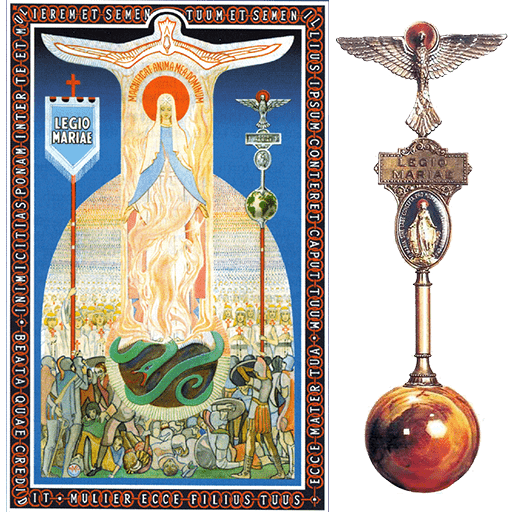May 2021 Allocutio
“The Descent of the Holy Spirit on the Apostles”
By Fr. Paul Churchill
We are in Pentecost time and that causes me to reflect on the third Glorious Mystery of the Rosary. But how should we announce that mystery?
When I look at the Vatican website it states it as The Descent of the Holy Spirit. I wondered at what that formulation was saying. Perhaps it was being cautious, not wanting to get involved in the question on whether there were others present in the room with the Apostles on Pentecost. Or perhaps it intended to allow space for the many personal interventions of the Holy Spirit over the ages?
Another traditional formulation of this mystery, one I think we all grew up with, is The Descent of the Holy Spirit on the Apostles. It focuses on a specific event 50 days after Christ rose (hence the word Pentecost from the Greek for fifty). St Mark’s Gospel speaks of our risen Lord meeting the apostles during those 50 days and sending them out to proclaim the good news (Mk 16:14-18). St. Luke also speaks of the risen Lord meeting the apostles and telling them to first await the promised Holy Spirit (Acts 1:1-8). And the account of Pentecost is sandwiched between the choice of Matthias to replace Judas Iscariot (Acts 1:26), thus restoring the Twelve, and verses clearly speaking of Peter and the other eleven proclaiming the Good News (Acts 2:14, 27). There is no doubt that Acts shows us the apostles being changed by that coming of the Holy Spirit enabling them to overcome fear and carry out their mission.
In recent times I have heard a new formulation of this mystery which says The Descent of the Holy Spirit on Our Lady and the Apostles. In my view this is problematic even if well intended. Let me explain.
The first problem is that the Acts do not mention Mary being present on Pentecost day. After the Ascension (at which event no mention is made of Our Lady), at their first meeting (Acts 1:12-14), they had with them some women, Jesus’ relatives and Mary. A few days later Peter deals with the question of a replacement for Judas, the betrayer (Acts 1:15ss). Others are present but there is no mention of Mary. After choosing Matthias we are told of another day, Pentecost. The text and context are ambiguous about who was present. “… and as the lot fell to Matthias he was listed as one of the twelve. When Pentecost day came around, they had all met in one room …” (Acts 1:26; 2:1). Who are the “they all”? It may refer only to the twelve apostles or it may include more. But there is no mention of Mary.
There is however an even bigger problem. When the angel Gabriel appeared to Mary he announced God’s mission to her. She was to be the mother of the Saviour. When she sought clarification on this she was told, “The Holy Spirit will come upon you” (Lk 1:35). The Holy Spirit was given to her not just so that she could physically conceive Jesus but to be his mother and to carry out her mission as mother and not just to the Head but also to the Mystical Body, as many saints would say. There is no doubt that that outpouring of the Holy Spirit at the Annunciation/Incarnation was the great momentous event in Mary’s life and indeed had a huge significance for us all. We must not take from it.
We do well to remember our sacramental theology. You can only receive the Sacrament of Confirmation once. Given that the Holy Spirit had already come to Mary at the moment of the Incarnation what meaning would his descent upon her at Pentecost have?
It is clear from the words of Jesus recorded at the end of St. Mark’s Gospel and at the beginning of Acts that the apostles were to receive the Holy Spirit to help them undertake their mission. And the events of Pentecost show the effect that had. Their fear was overcome. But Mary had already received the Holy Spirit over thirty years earlier and had already been carrying out her mission. Indeed immediately after the angel left her she went, a young girl full of confidence, with no fear, to bring Jesus to The Baptist, Elizabeth and Zechariah. She was full of the Holy Spirit. And interestingly after that mention of her praying with the Apostles just after the Ascension, her name is not mentioned again in the Acts.
My advice then is that when announcing this third glorious mystery of the Rosary we use the formulation The Descent of the Holy Spirit or The Descent of the Holy Spirit on the Apostles. The formula The Descent of the Holy Spirit on Our Lady and the Apostles has too many problems with it. I am not saying absolutely that she was not in the company of the Apostles on the day of Pentecost. If she was there, it was not to receive the Holy Spirit who had already come to her. No, if she was there, her role was to pray and ask that the Holy Spirit would grant them what they needed to carry out the mission her son gave them. She was already the mother of the Church.

